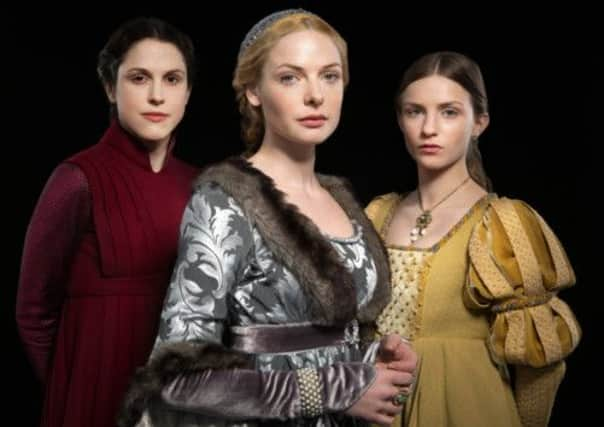TV previews: The White Queen | Scientologists At War


The White Queen
Tomorrow, BBC1, 9pm
The Greatest Shows On Earth
Monday, Channel 4, 10pm
Scientologists At War
Monday, Channel 4, 9pm
Meanwhile, the kind of people who have always enjoyed this kind of thing just ignore all of that and will be happy to see The White Queen, which isn’t really very sexy or modern but is solidly well-made.
Based on a series of books by historical novelist Philippa Gregory (who also wrote The Other Boleyn Girl), this is the Wars of the Roses without dragons – it begins in 1464 as the Yorks seem to be winning, with Edward IV newly on the throne and confident he can mop up the conflict (“I’m young, fast and lucky,” he smirks, “lucky in war and lucky in love”). Behind him, looking moody, is James Frain’s Earl of Warwick, the fixer and kingmaker, who is not best pleased at his boss’ romance with a pretty but unconnected young widow. Meanwhile the Lancaster camp haven’t given up, rallying behind the boy Henry Tudor (spoiler: he wins in the end).
Advertisement
Hide AdThere are a lot of characters to introduce and in this opening instalment (of ten) it’s the more experienced actors who stand out, especially Frain and Janet McTeer as the royal Mother-in-law and witch. The mystic visions are clunky and the pace is a little staid, but historical drama fans should find this pretty cool, yeah.
It used to be a truism that British TV was terrible, but still better than that of everywhere else. I’m not sure anyone would think to say this now in the era of critically-revered American cable shows like Mad Men, the aforementioned Game Of Thrones and Breaking Bad, not to mention the current popularity of European imports such as The Killing and The Returned. But the fact remains that it’s often not until you go abroad that you realise other countries have some right old tat as well.
The experience of boggling at some weird game show in a hotel room was immortalised by Clive James, who spent most of the 1980s laughing at Japanese people being apparently tortured for their countryfolk’s entertainment, in his series Clive James On TV (later taken over by Chris Tarrant, who never seemed as genuinely amused). That format has been off our own screens for a while – perhaps out of embarrassment as it would be hard to mock others while Hole In The Wall exists – but Channel 4 appear to be tentatively bringing it back this week, with The Greatest Shows On Earth.
Daisy Donovan presents and there’s a bit more to it than just laughing at clips, as she actually visits the sets of odd foreign programmes and attempts to string together a theory about what they say about their cultures. For instance, in the first one, she goes to Brazil where there is both a really explicit version of Crimewatch which shows all the bloody corpses (don’t have nightmares!) and a specialised beauty contest called Miss Bum Bum (it is what you think). From this Daisy concludes that Brazilians aren’t really up on feminism and are unfortunately used to extreme violence – or at least those who watch these particular shows are. There are inevitable generalisations but it’s certainly intriguing, particularly if you’re interested in TV, or Brazil. Yet the focus on these extreme shows rather than, say, a high quality Brazilian drama or sitcom reveals that at heart, this is Clive James inviting us to laugh at the funny foreigners again.
I wonder how many lawyers scrutinised every frame of Scientologists At War – no, not the original title of Battlefield Earth but Channel 4’s documentary film about trouble in the organisation. Given Scientology’s noted embrace of the courts, quite a few, I suspect, but there is still enough scandal here to entertain those whose idea of a good time is mocking Tom Cruise for actually believing in aliens as well as being paid to pretend to fight aliens.
But the focus of the film is on those who, while they’ve left the Church of Scientology, haven’t given up on the tenets drawn up by former science fiction writer L Ron Hubbard: they are now calling themselves Independent Scientologists. They think that the first lot – Cruise’s pal David Miscavige and co – have lost the faith, not because of the aliens or for using e-meters to measure whether a person has been cleansed of spiritual hang-ups (available for sale on e-Bay), but for getting distracted from all that. In return, they’ve been dubbed heretics and “squirrels” – don’t ask.
Advertisement
Hide AdThen there’s the delightfully-named Marty Rathbun, once the Inspector General of the Church of Scientology’s Religious Technology Centre (which apparently meant enforcing registered trademarks and copyrights), but now the most notorious defector who dished the dirt claiming, among other things, that the leadership beat people up, spied on members and regularly got together to drink whisky and have a right old laugh at secret recordings of Tom Cruise’s most personal confessions.
For an outsider, it’s almost impossible to know the truth (though one does come away feeling sorry for poor Tom), but there’s a peculiar fascination to the story, which takes in so many worldly elements: celebrity, money and the extraordinary life of the late Hubbard himself. Yet for all its strangeness, maybe the schism is the most normal thing about this new church – after all, every other religion has split at some time, hasn’t it?